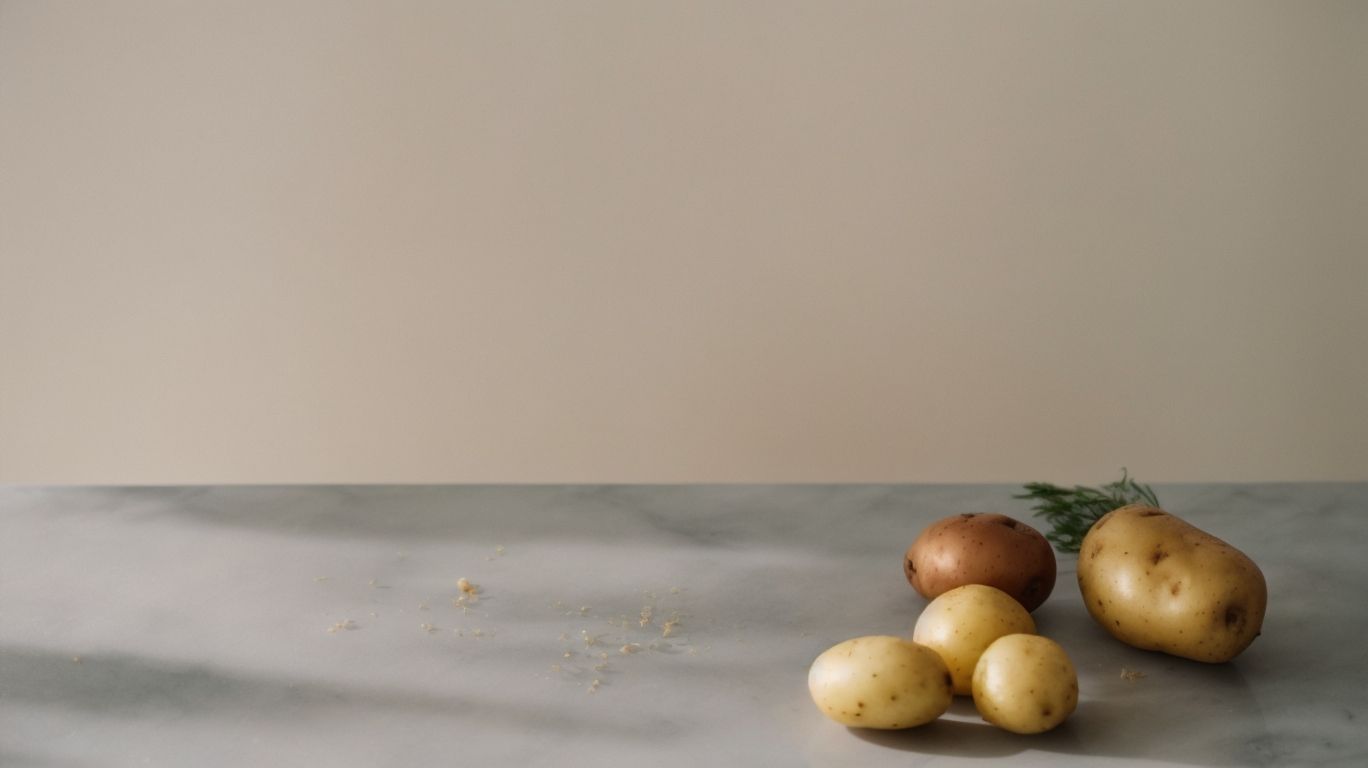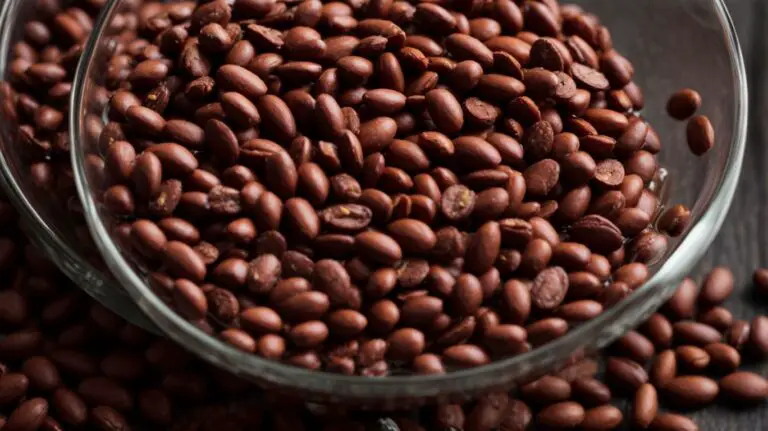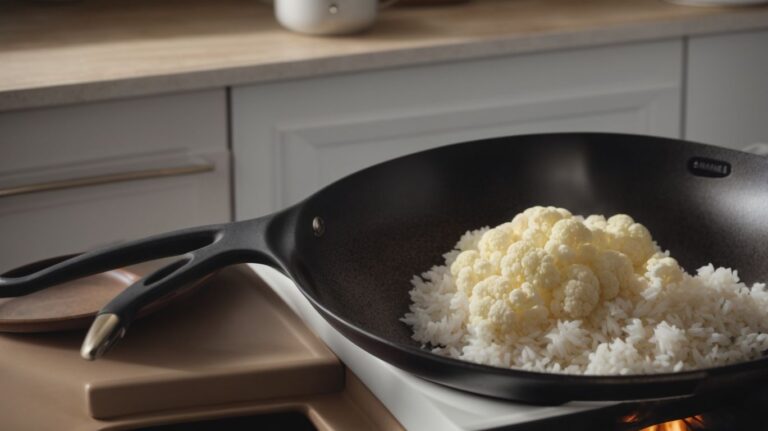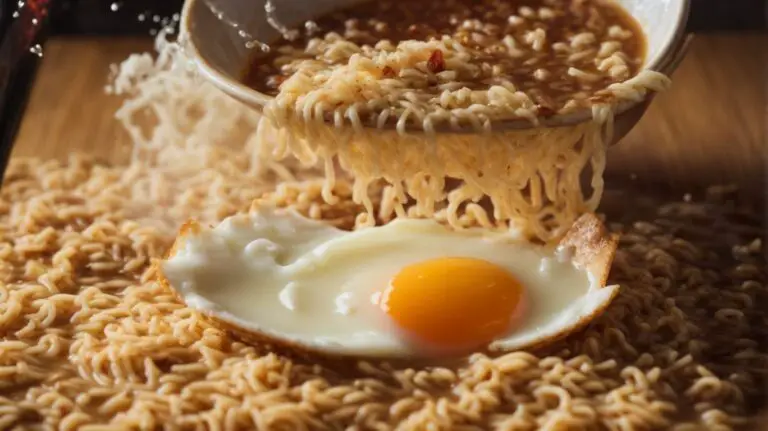How to Cook Potatoes for Baby?
Are you a parent looking to introduce potatoes into your baby’s diet but unsure where to start?
We will explore why potatoes are a nutritious choice for babies, when you can start feeding them to your little one, and how to choose the right type of potatoes.
Find out more about different preparation methods, food pairings, storage tips, and safety considerations to learn all about cooking potatoes for your baby!
Key Takeaways:
Why are Potatoes Good for Babies?
Introducing potatoes to babies can be beneficial due to their nutritional value and versatility in different recipes. Potatoes are a good source of essential nutrients that support the baby’s growth and development.
Potatoes are rich in important nutrients such as vitamin C, potassium, and fiber, which are vital for a baby’s overall health. Vitamin C helps boost their immune system, while potassium supports proper nerve function. Fiber aids in digestion and can help prevent constipation in babies.
It’s important to be aware of potential allergies or sensitivities that babies may have to potatoes. If there is a family history of allergies, it’s recommended to introduce potatoes cautiously. Watch for any signs of an allergic reaction, such as rash, swelling, or difficulty breathing.
When introducing potatoes to babies, consider mashing or pureeing them to make them easier to digest. You can mix mashed potatoes with other vegetables or proteins to create a nutritious and tasty meal for your little one.
When Can Babies Start Eating Potatoes?

Credits: Poormet.Com – William Thomas
Babies can typically start eating potatoes as part of their weaning process, usually around 6 to 8 months of age.
It is essential to introduce new foods gradually and observe the baby’s reaction to ensure they can tolerate and digest potatoes comfortably.
When introducing potatoes to babies, it’s recommended to start with well-mashed or pureed versions to avoid choking hazards. Make sure the texture is suitable for your baby’s age and development stage. Avoid adding salt, sugar, or other seasonings to the potatoes to keep them plain and gentle on your baby’s sensitive stomach.
Steaming or boiling potatoes until they are very soft and then blending them to a smooth consistency can be a good way to prepare this nutritious vegetable for young infants. Remember to always test the temperature before offering it to your baby to prevent any burns.
Choosing the Right Potatoes for Your Baby
Selecting the right potatoes for your baby involves considering mild-flavored varieties that are gentle on their palate. Opt for potatoes that offer a subtle taste to introduce the baby to this nutritious food in a pleasant way.
When introducing potatoes to your little one, it’s crucial to choose types like Yukon Gold, Russet, or Sweet Potatoes, known for their mild flavors. These varieties tend to be less overpowering, making them ideal for young taste buds. By starting with mild options, you can help develop your baby’s palate to appreciate the natural sweetness and gentle texture of potatoes.
Each type of potato brings a unique touch to your baby’s meals, with Yukon Gold offering a buttery flavor, Russet providing an earthy taste, and Sweet Potatoes adding a hint of natural sweetness. By experimenting with different kinds, you can tailor the flavor profile to suit your baby’s preferences, ensuring a positive food experience.
What are the Best Types of Potatoes for Babies?
When selecting the best types of potatoes for babies, opt for varieties with mild and delicate flavors that are well-suited for young palates. Varieties like Yukon Gold or Red Potatoes are often recommended for their mild and slightly sweet taste.
These types of potatoes are not only flavorful but also easy to digest, making them ideal choices for introducing solid foods to babies. The texture of Yukon Gold potatoes is creamy, which can be appealing to babies transitioning to more solid textures. Red Potatoes, on the other hand, offer a slightly firmer texture, promoting chewing practice for little ones.
Choosing the right variety can significantly impact your baby’s acceptance of potatoes, ensuring a positive first experience with this nutritious and versatile vegetable. These gentle flavors lay a foundation for cultivating a love for potatoes and other healthy foods in the future.
Organic vs. Non-Organic Potatoes for Babies
When deciding between organic and non-organic potatoes for babies, consider the potential exposure to pesticides and chemicals.
Organic potatoes are grown without synthetic chemicals, making them a preferable choice for parents looking to minimize chemical exposure in their baby’s diet. Opting for organic produce can significantly reduce the intake of pesticides, which have been linked to various health concerns, especially in developing infants.
Even though non-organic potatoes may contain residues of pesticides, thorough washing and peeling can help mitigate some of these risks. Regardless of the type chosen, it is essential to wash all potatoes well and peel them to reduce any potential exposure to contaminants.
How to Prepare Potatoes for Your Baby?
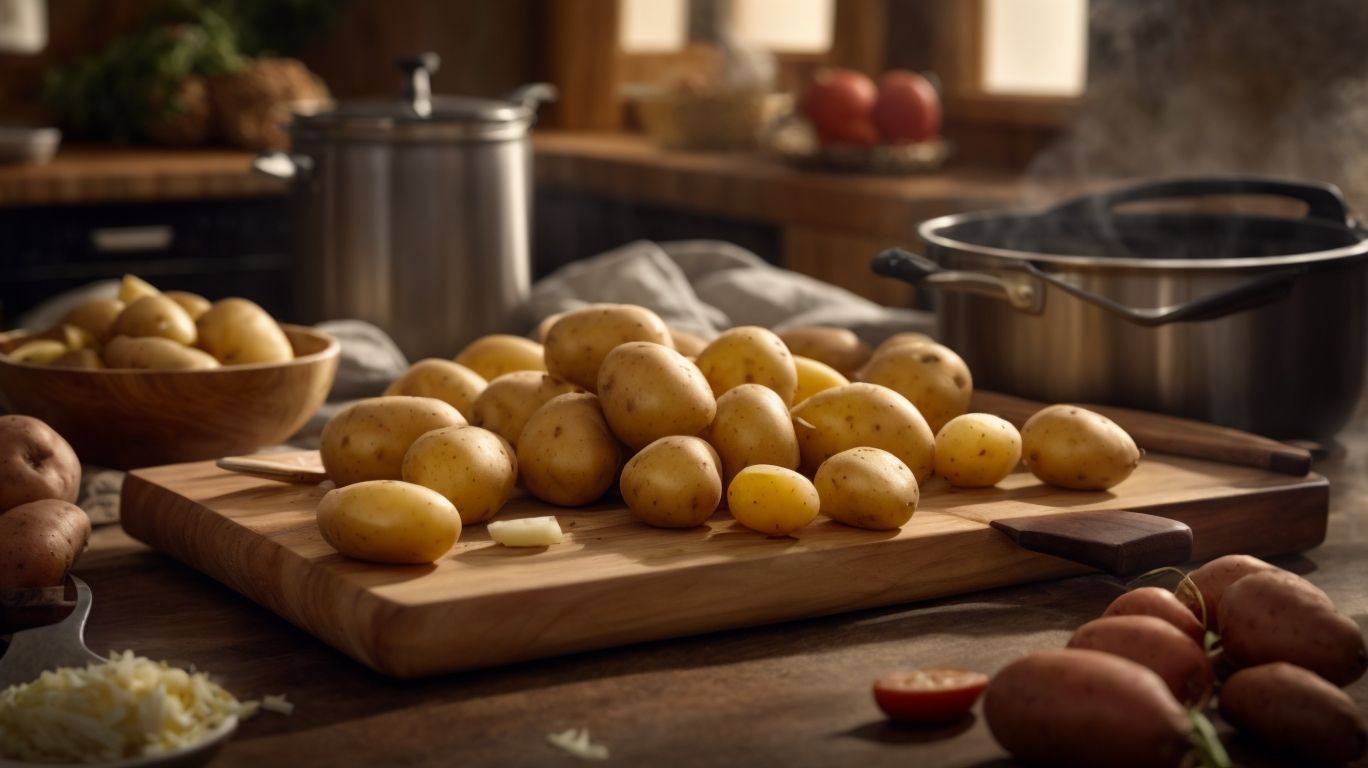
Credits: Poormet.Com – Thomas Hill
Preparing potatoes for your baby involves methods like mashing or pureeing to achieve a suitable texture for their stage of development. The goal is to create a smooth and easy-to-swallow consistency that is gentle on the baby’s palate.
When mashing potatoes for your little one, make sure to boil them until they are soft enough to easily mash with a fork or potato masher. For pureeing, steaming the potatoes can help retain more nutrients compared to boiling. The texture you aim for should be lump-free to prevent any choking hazards. By adjusting the water content and consistency during the process, you can tailor the texture to suit your baby’s preferences and stage of weaning.
Peeling vs. Leaving the Skin on Potatoes for Babies
Deciding whether to peel or leave the skin on potatoes for babies depends on their age and texture preferences. Peeling the potatoes can create a smoother texture, while leaving the skin on adds more fiber and nutrients to the dish.
For younger babies who are just getting started on solid foods, it might be better to peel the potatoes to ensure a smoother consistency that is easier for them to digest. As babies grow older and can handle more textures, leaving the skin on can introduce them to different sensations and provide additional health benefits. It’s important to note that potato skins are a good source of fiber, potassium, and vitamin C, which are vital for their growth and development.
Boiling vs. Steaming Potatoes for Babies
The choice between boiling and steaming potatoes for babies depends on the desired texture and nutrient retention. Boiling may result in a softer consistency, while steaming can help preserve more nutrients in the potatoes.
When boiling potatoes, the high temperature and direct contact with water can break down the cell structure quicker, leading to a softer and more easily mashable texture, which can be ideal for younger babies transitioning to solid foods. This method may cause water-soluble nutrients like Vitamin C to leach out into the cooking water.
On the other hand, steaming involves cooking the potatoes using steam, a gentler method that helps retain more nutrients since the potatoes aren’t submerged in water. This can result in a firmer texture and a slightly sweeter flavor, making it a great option for older babies with developed taste buds.
Mashing vs. Pureeing Potatoes for Babies
When preparing potatoes for babies, both mashing and pureeing are effective methods to achieve a suitable texture for their developmental stage. Mashing creates a slightly textured consistency, while pureeing results in a smoother blend.
Mashing involves crushing the cooked potatoes into small, soft pieces, providing babies with a gentle introduction to varied textures. This method is ideal for babies who are starting to explore solid foods but may not be ready for fully pureed options yet.
On the other hand, pureeing involves blending the potatoes into a fine, creamy texture, making it easier for younger infants or those with sensitive palates to consume. Pureed potatoes are suitable for babies who are in the early stages of transitioning to solid foods.
What Foods Can You Mix with Potatoes for Babies?
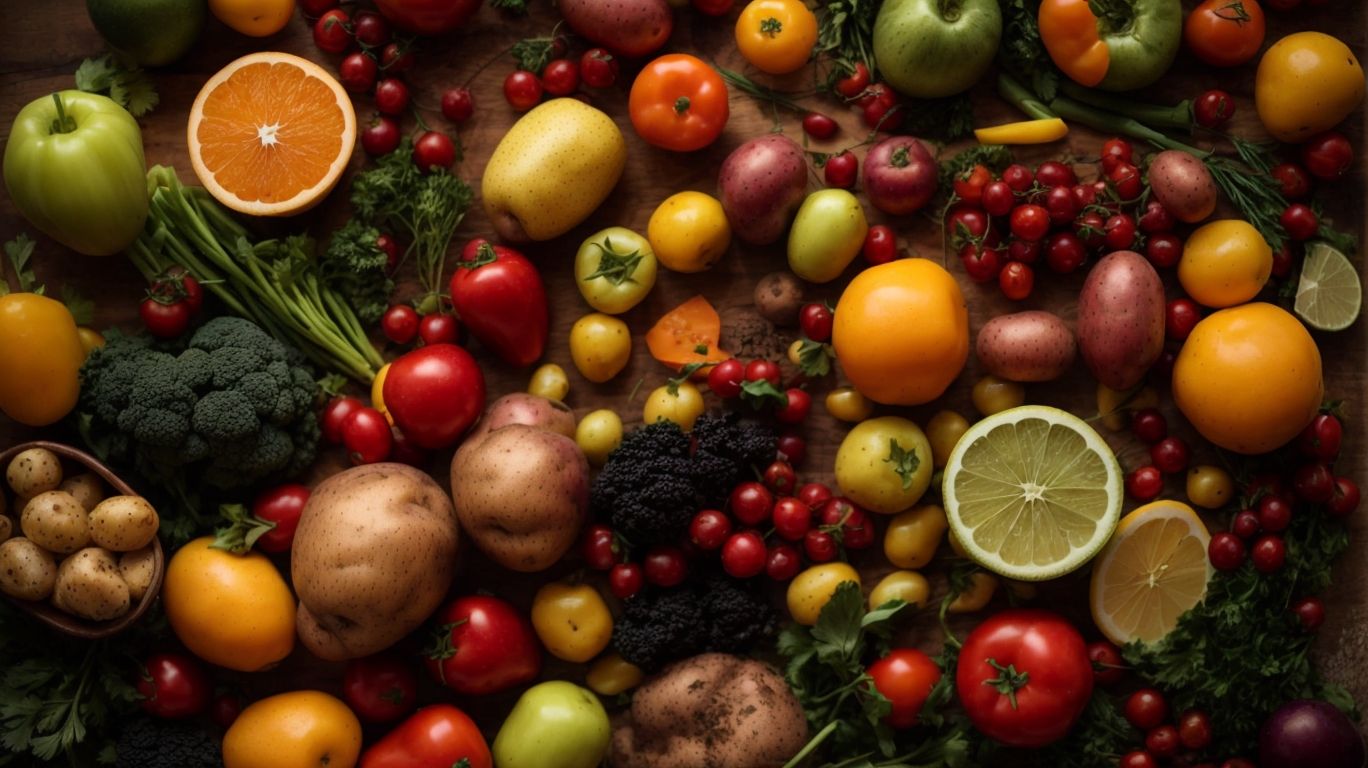
Credits: Poormet.Com – Alexander Garcia
Mixing potatoes with other nutritious foods like apples, carrots, sweet potatoes, and broccoli can enhance the flavor and nutrition of the meal for babies. Combining different ingredients introduces variety and essential nutrients into the baby’s diet.
Introducing potatoes into these baby food combinations not only adds a delicious creamy texture but also provides a good source of carbohydrates, energy, and fiber. Apples bring natural sweetness and a dose of vitamin C, while carrots offer beta-carotene for eye health.
Pairing sweet potatoes with potatoes can create a colorful puree rich in vitamins A and C. Broccoli, known for its antioxidant properties, can be pureed with potatoes to introduce a savory element and essential minerals like iron and calcium into the meal.
Apples
Apples are a popular choice to mix with potatoes for babies due to their natural sweetness and soft texture. Combining apples with potatoes adds a fruity flavor profile to the meal that appeals to young taste buds.
Incorporating apples into potato-based recipes for babies not only enhances the sensory experience but also provides a range of health benefits. Apples are rich in essential nutrients like Vitamin C, fiber, and antioxidants, which support overall growth and development in infants.
To prepare a simple yet nutritious dish, try steaming or boiling diced apples along with potatoes until soft and then mash them together for a velvety puree. Another popular recipe idea is to bake sliced apples and potatoes with a sprinkle of cinnamon for a delicious and aromatic dish that babies will enjoy exploring.
Carrots
Carrots are a nutritious addition to potato dishes for babies, offering a vibrant color and mild sweetness. Pairing carrots with potatoes introduces a mix of flavors and textures that can be appealing and beneficial for the baby’s diet.
Carrots are not only rich in essential nutrients like vitamin A, K, and fiber, but they also add a beautiful orange hue to the dish, making it visually attractive and engaging for your little one. As for potatoes, they provide a creamy texture that complements the crunchiness of carrots, creating a well-rounded eating experience for your baby.
To create a nutritious and flavorful meal for your baby, you can try making a simple carrot and potato puree. Simply steam or boil chopped carrots and potatoes until tender, then blend them together until smooth. You can also incorporate other ingredients like a dash of olive oil or a sprinkle of mild spices to enhance the taste.
Sweet Potatoes
Sweet potatoes are a popular choice to mix with regular potatoes for babies, offering a naturally sweet flavor and soft texture. Including sweet potatoes in baby meals can introduce variety and additional nutrients to their diet.
One of the primary benefits of incorporating sweet potatoes into potato-based recipes for babies is the rich source of essential vitamins and minerals they provide. Sweet potatoes are packed with nutrients like vitamin A, vitamin C, and fiber, which are crucial for the healthy development of growing infants. By combining sweet potatoes with regular potatoes, caregivers can create dishes that are not only delicious but also nutritionally balanced.
Broccoli
Broccoli is a nutrient-rich vegetable that pairs well with potatoes for babies, offering a contrasting texture and vibrant color. Incorporating broccoli into potato dishes introduces essential vitamins and minerals to the baby’s diet.
For babies who are just starting their solid food journey, steamed and mashed broccoli mixed with mashed potatoes can be a delightful introduction to these vegetables. The combination of creamy potatoes with the slightly crisp texture of broccoli provides a sensory experience that appeals to both taste and sight. You could also try creating a baby-friendly potato and broccoli puree by boiling and blending the two together, ensuring a smooth consistency for easy consumption.
How to Store Leftover Potatoes for Your Baby?
Properly storing leftover potatoes for your baby is crucial to maintain freshness and safety. Refrigerate any unused portions promptly in an airtight container to preserve the quality of the food for future consumption.
Avoid leaving the potatoes at room temperature for extended periods, as this can lead to bacterial growth and spoilage. When storing, ensure that the container is tightly sealed to prevent any odors or flavors from permeating the potatoes.
The shelf life of refrigerated potatoes can vary depending on the type and preparation method. Generally, mashed potatoes may last up to 3-5 days in the fridge, while roasted potatoes may stay fresh for 4-6 days.
When reheating leftover potatoes, make sure to heat them thoroughly until they are piping hot to kill any potential bacteria. Always check the temperature before serving to your baby to prevent any burns.
Safety Tips for Feeding Potatoes to Your Baby
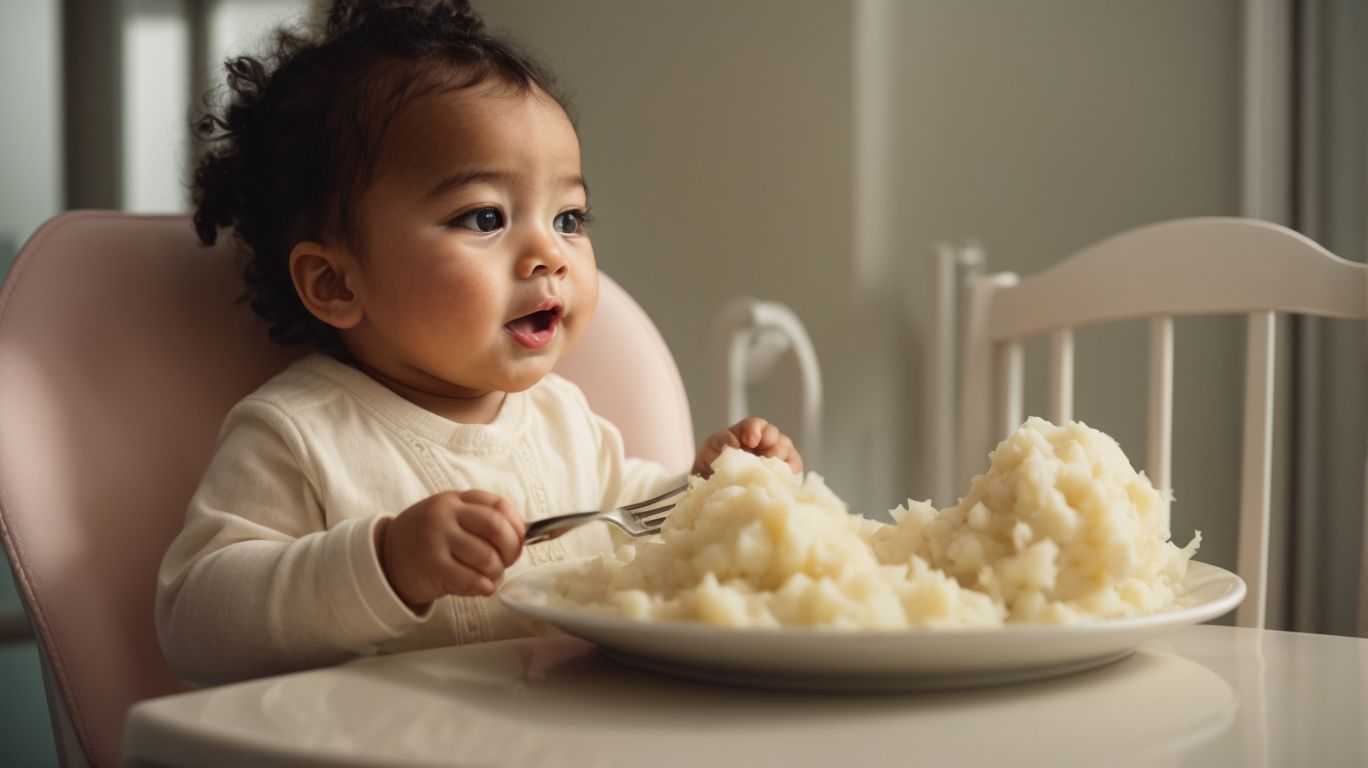
Credits: Poormet.Com – Eugene Hill
Feeding potatoes to your baby requires attention to potential choking hazards and allergies. Ensure the potatoes are cooked to an appropriate texture, cut into small, manageable pieces, and monitor the baby closely during mealtime to prevent any safety concerns.
When introducing potatoes to your little one, it’s crucial to take precautions to avoid any risks. Opt for mashed or pureed potatoes initially to minimize choking hazards. To make the potatoes more digestible, consider adding breast milk or formula. For older babies, you can offer soft potato cubes or slices, ensuring they are cooked to a soft consistency. Always watch closely as the baby eats, staying within arm’s reach to respond quickly if needed.
Be aware of potential potato allergies. Start by introducing small amounts and watch for any adverse reactions such as rashes, vomiting, or diarrhea. If you notice any unusual symptoms, stop feeding potatoes and consult a pediatrician immediately. When preparing potatoes, avoid added salt or spices, sticking to simple, natural flavors. By following these steps, you can make feeding time both safe and enjoyable for your little one.
Conclusion
Introducing potatoes to your baby can be a nutritious and enjoyable experience when approached with care and attention to safety. By selecting the right types of potatoes, preparing them thoughtfully, and combining them with other nutritious foods, you can create wholesome meals that support your baby’s growth and development.
Regarding feeding potatoes to babies, their nutritional value is a key factor to consider. Potatoes are an excellent source of carbohydrates, potassium, vitamin C, and fiber, all of which are essential for your baby’s overall health and well-being. It’s crucial to ensure that the potatoes are cooked thoroughly to make them easy for your baby to digest. Safety considerations also play a vital role, such as avoiding added salt, spices, or fatty toppings, and being cautious of any potential allergic reactions.
Introducing various flavors of potatoes can help expand your baby’s palate and encourage a diverse diet. From mashed potatoes to roasted sweet potatoes, there are numerous ways to incorporate this nutritious vegetable into your baby’s meals. By offering a mix of textures and tastes, you can make mealtime an exciting and enjoyable experience for your little one.
Embracing potatoes in your baby’s diet not only adds nutritional value but also introduces a versatile ingredient that can be incorporated into a wide range of dishes. With proper preparation and mindful choices, potatoes can contribute to a well-rounded and nourishing feeding experience that supports your baby’s growth and development. So, don’t hesitate to include potatoes in your baby’s meals for a flavorful and wholesome dining experience!
Frequently Asked Questions
What are the health benefits of cooking potatoes for babies?
Potatoes are a great source of vitamins and minerals, including potassium, vitamin C, and folate. They are also rich in fiber, which promotes a healthy digestive system. When cooked properly, potatoes can provide essential nutrients for your baby’s growth and development.
How should I prepare potatoes for my baby’s meals?
Start by washing and peeling the potatoes, then chop them into small, bite-sized pieces. You can steam, boil, or bake the potatoes for your baby. Avoid adding any seasonings or salt, as babies’ digestive systems are still developing and may not be able to handle them.
Can I introduce potatoes to my baby’s diet if they have allergies?
If your baby has a history of food allergies, consult with their pediatrician before introducing potatoes into their diet. While potatoes are not a common allergen, it’s important to be cautious and observe any reactions your baby may have after consuming them.
What is the best age to start giving potatoes to my baby?
Babies can start eating solid foods around 6 months of age. At this stage, they may have enough digestive enzymes to break down the starches in potatoes. However, it’s always best to consult with your pediatrician before introducing any new food to your baby’s diet.
Are there any safety precautions I should take when cooking potatoes for my baby?
Make sure to cook potatoes thoroughly, as raw potatoes can be difficult for babies to digest. Also, always supervise your baby’s meals to prevent choking. Cut the potatoes into small, soft pieces and avoid giving them whole potatoes or large chunks.
What are some easy potato recipes for babies?
You can try mashed potatoes, potato puree, or even baked sweet potato fries as a healthy and delicious option for your baby. You can also mix mashed potatoes with other steamed or pureed vegetables for a more diverse meal. Be creative and have fun experimenting with different potato recipes for your little one.

